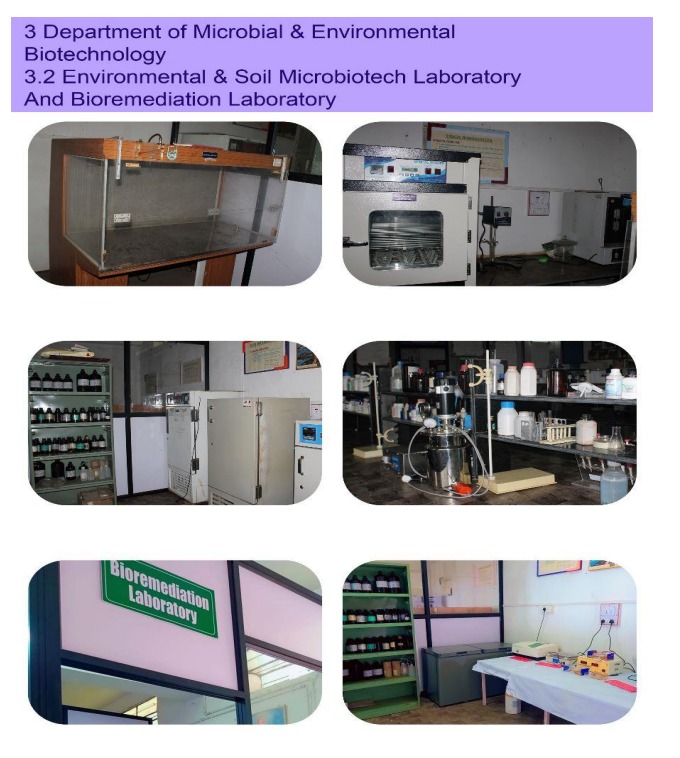Microbial and Envormental Biotechnology
Head of Department: Prof. Dhumal A.P.
Designation: Assistant Professor
About Department:
Environmental biotechnology research is focused on the application of biological, chemical, and physical principles to study interactions between microbial cells and their environment. This area is vital for prevention of environmental pollution and remediation of polluted environments
Microbial and Environmental Biotechnology at Aditya Agricultural Biotechnology College
Overview
Microbial and Environmental Biotechnology is a dynamic and interdisciplinary field that focuses on harnessing microorganisms and biotechnological processes to address environmental challenges, improve sustainability, and support bioremediation efforts. The field plays a pivotal role in waste management, pollution control, resource recovery, and the development of eco-friendly technologies. At Aditya Agricultural Biotechnology College, we offer a comprehensive program in Microbial and Environmental Biotechnology, providing students with the expertise to tackle contemporary environmental issues through biotechnological innovation.
Key Areas of Study
The curriculum in Microbial and Environmental Biotechnology covers a broad range of topics that integrate microbiology, environmental science, and biotechnological applications. Core areas of study include:
- Microbial Ecology and Biotechnology: Study of microorganisms and their roles in various ecosystems, including their applications in industrial and environmental biotechnology for waste treatment and resource recycling.
- Bioremediation: The use of microorganisms and plants to detoxify or degrade pollutants, such as heavy metals, petroleum products, and pesticides, from contaminated sites, including soil and water.
- Wastewater Treatment: Advanced microbial processes and biotechnological methods for the treatment and purification of industrial, agricultural, and domestic wastewater to meet environmental regulations and reduce ecological impact.
- Environmental Microbiology: The role of microbes in maintaining the balance of natural ecosystems, their involvement in nutrient cycling, and their potential in environmental protection strategies.
- Biofuels and Renewable Energy: The exploration of microbial processes for producing alternative energy sources such as biogas, bioethanol, and biodiesel from renewable organic materials.
- Sustainable Agriculture and Waste Management: The application of biotechnological tools to improve waste recycling, composting, and reduce the ecological footprint of agricultural practices.
Research and Innovation
Aditya Agricultural Biotechnology College fosters a research-driven approach to Microbial and Environmental Biotechnology, encouraging students to engage in projects that aim to create sustainable, eco-friendly solutions. Areas of research include:
- Biodegradation of Environmental Pollutants: Exploring the potential of microbes to break down pollutants in soil, water, and air, contributing to pollution control and environmental cleanup.
- Microbial Fuel Cells and Bioenergy: Investigating the use of microorganisms to generate electricity and biofuels, providing innovative solutions to energy crises and reducing reliance on fossil fuels.
- Waste-to-Value Technologies: Development of processes that convert waste materials into valuable products, such as biodegradable plastics, biofertilizers, and renewable chemicals, promoting a circular economy.
- Climate Change Mitigation: Studying the role of microbes in carbon sequestration and other environmental processes that mitigate climate change and improve ecosystem health.
Students are encouraged to collaborate with faculty on innovative projects that contribute to sustainable environmental practices and green technologies.
Career Prospects
Graduates of the Microbial and Environmental Biotechnology program are well-equipped to pursue careers in environmental consulting, waste management, renewable energy industries, and academic research. Career paths include:
- Environmental Biotechnologist
- Bioremediation Specialist
- Wastewater Treatment Engineer
- Biofuels and Renewable Energy Technician
- Environmental Consultant
- Research Scientist in Microbial Ecology
- Regulatory Affairs Expert in Environmental Biotechnology


